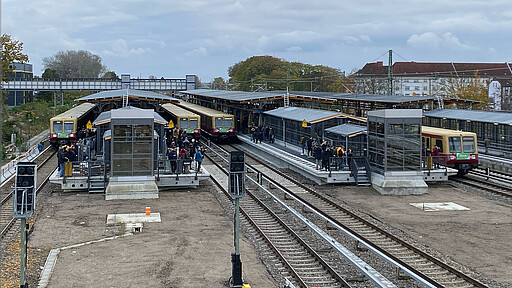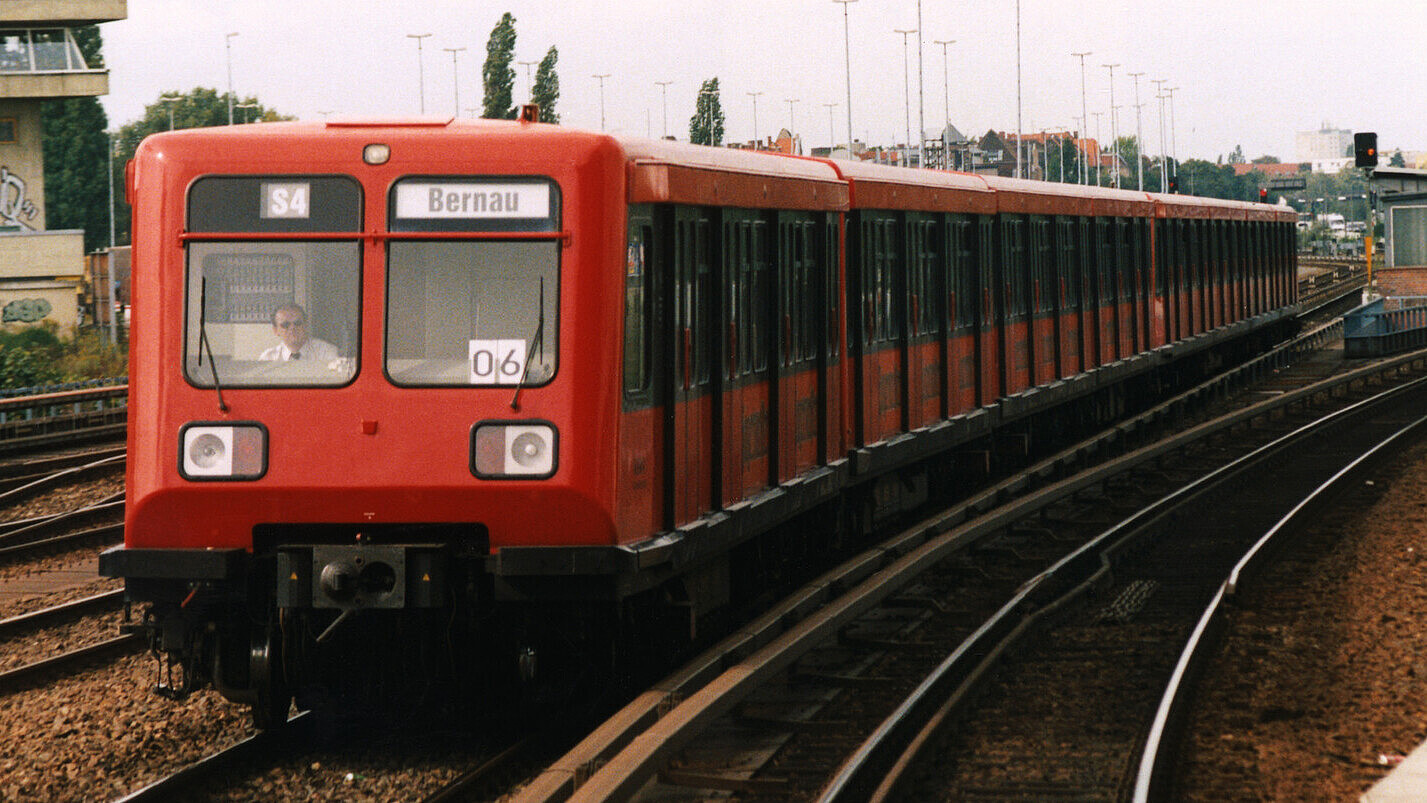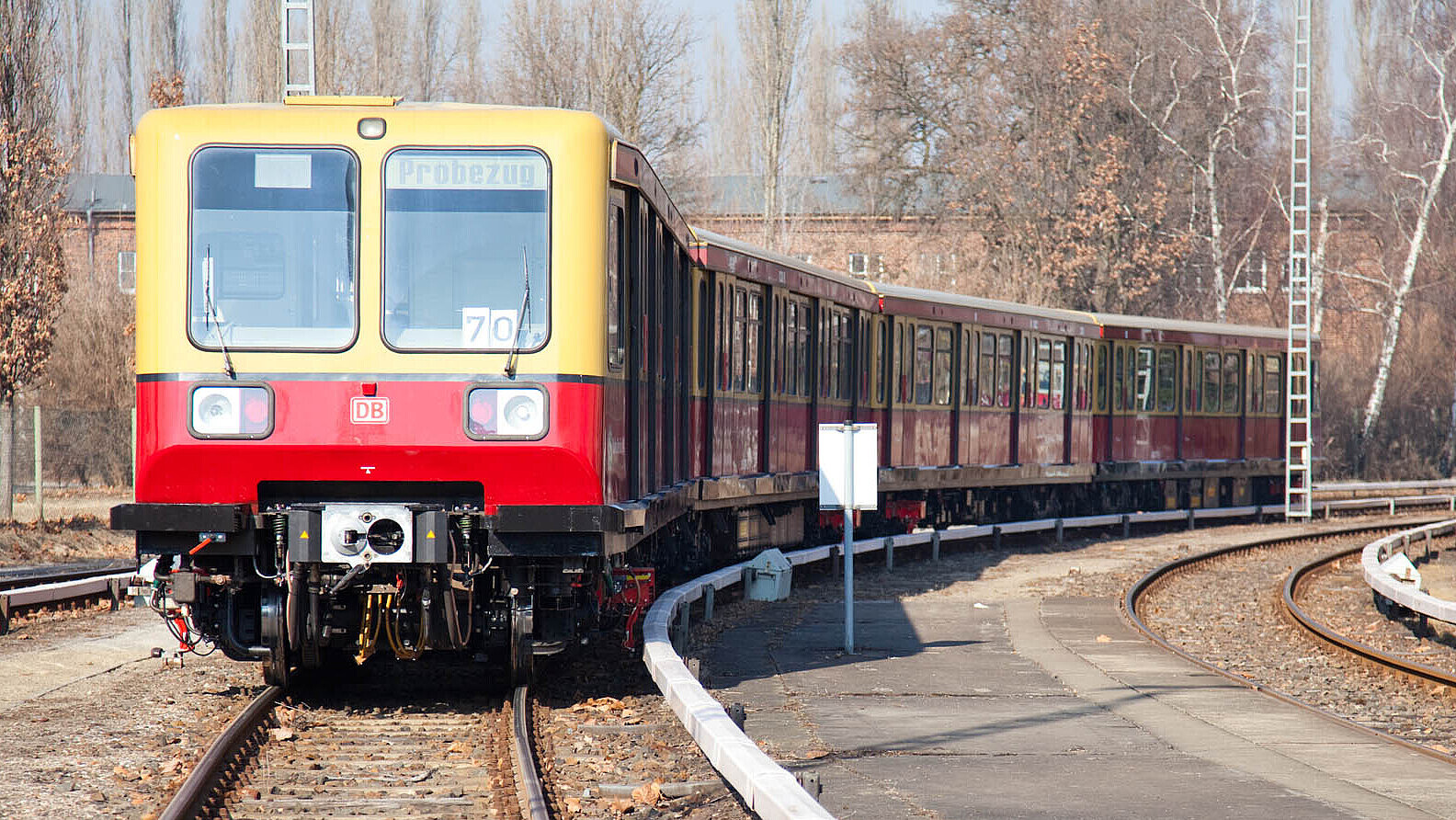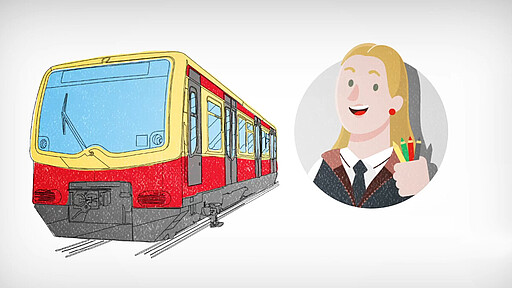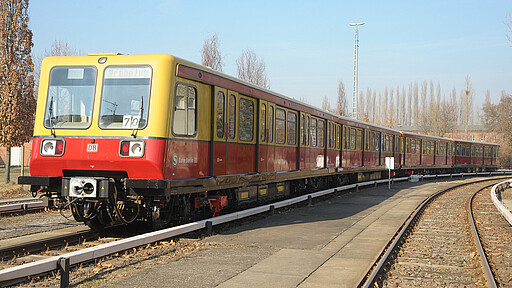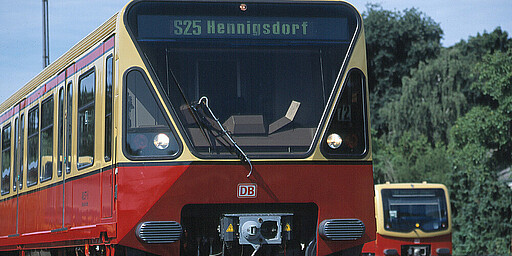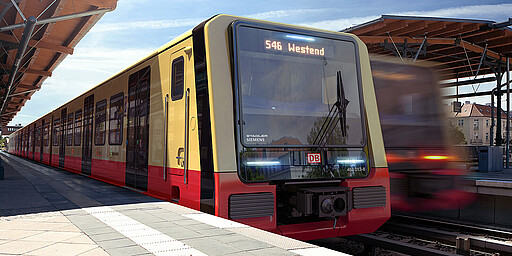Our 485 series
The recently retired 485 series is our most recent historic S-Bahn.
Rallying the past
Now it's final: The 485 series of our S-Bahn fleet has been taken out of service. On it's last day of service, 12 November 2023, returned one last time to its long-time regular lines S8 and S47.
For these so-called rallies ("Sternfahrt"), four trains of the 485 from all four directions stood next to each other at Schöneweide station for two minutes almost simultaneously - once every hour at 09:57 - 09:59, 10:57 - 10:59; 11:57 - 11:59, 12:57 - 12:59 and 13:57 - 13:59 on tracks 3, 4, 5 and 6.
After five of these "rendezvous", the first farewell took place: two trains left the S-Bahn network and the other two started their very last journey: As special trains, they travelled in the opposite direction on the S41 and S42 Ringbahn lines. They narrowly missed their planned penultimate "rendezvous point" at Beusselstraße station (the so-called zero point of the Ringbahn), as the rush for the last journey was enormous and the carriages were packed. Instead, the trains then met at Wedding station before ending their journey and the operation with a final stop in Schöneweide.
A child of the East
Back in the early 1980s, today’s “vintage” S-Bahn model was absolutely state-of-the-art: our 485 series.
Following World War Two, S-Bahn production in Berlin had more or less ground to a halt. This only changed in 1979 when Deutsche Reichsbahn (the GDR’s state railway responsible for operating all S-Bahn lines in both East and West Berlin) started engineering a brand-new S-Bahn generation. It still took until early-1990 for the first batch of production vehicles to be delivered.
Why this series was renamed
Some Berliners might remember that the 485 series used to have a different name. Back in the GDR, these trains were known as the 270s series, but this was changed shortly after reunification.
The 485 series interior
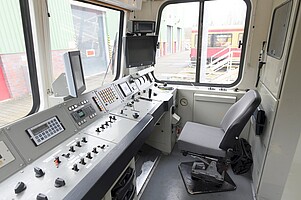
485 series driver’s cab
Each quarter train consists of a powered carriage with an operator cab and an unpowered side carriage.
- ©
- Oliver Lang
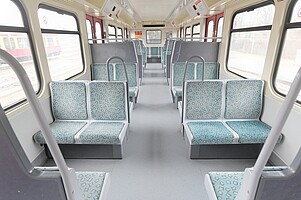
485 series passenger compartment
Each 485 series quarter train offers seating for 97 passengers plus standing room for a further 253.
- ©
- Oliver Lang
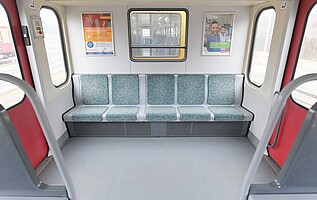
485 series seating
Distinctive 485 series feature: the 5-seater row at the rear of the carriage.
- ©
- Oliver Lang
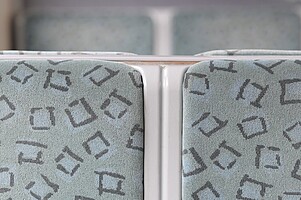
485 series upholstery
The 485 series also features the characteristic, teal-coloured Berlin S-Bahn upholstery pattern. Please note: this will soon be changed to the blue colour scheme found in Deutsche Bahn trains all across Germany.
- ©
- Oliver Lang
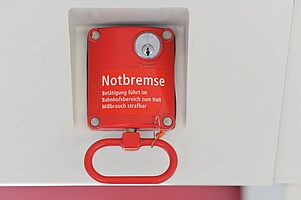
485 series emergency break
Uniform design: the 485 series emergency breaks near the doors of each S-Bahn train closely resemble those found in the 481 and 480 series.
- ©
- Oliver Lang
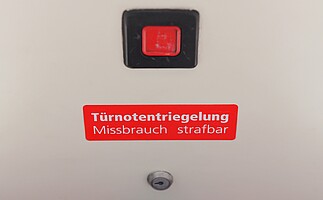
485 series emergency door release
Each door features an emergency unlocking mechanism for manual opening in case of emergency.
- ©
- Oliver Lang
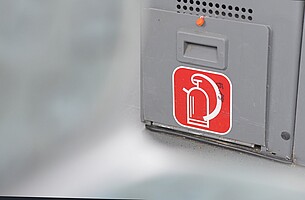
485 series fire extinguishers
Each S-Bahn car carries a fire extinguisher and an additional emergency hammer for breaking glass.
- ©
- Oliver Lang
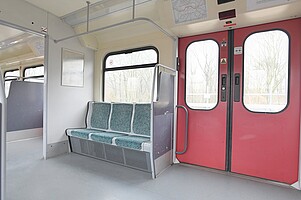
485 series interior
The six-seater 485 series multi-purpose compartments are dividing into opposing rows of three.
- ©
- Oliver Lang
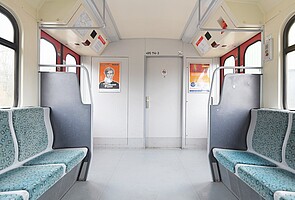
485 series interior
No peeking: unlike more recent production series, the 485 trains don’t have a window in the driver’s cab door.
- ©
- Oliver Lang
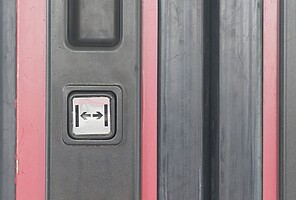
485 series interior
Black and angular, not green and round: the 485 series’ manual door openers.
- ©
- Oliver Lang
An early pioneer of sustainability
The 485 series is characterised by a lightweight aluminium construction and an electrodynamic braking system designed to feed recovered brake energy back into the electric grid. These innovations helped to cut energy consumption by a third compared to pre-war models.
Why "Coke Can"?
What earned this series its “Coke Can” moniker? The answer is simple: its unique paintwork. For quite some time, these trains sported a red finish with an anthracite-coloured window strip. While the nickname remained, the colour scheme didn’t: starting in 2002, all carriages were repainted in the traditional claret and ochre S-Bahn colours.
Oldie, but goldie
Originally, the 485 was scheduled for gradual phasing out from the mid-2000s. To support the S-Bahn vehicle fleet, some of these deactivated trains were retrofitted in our Fleet Maintenance Depot in Schöneweide from 2010. The first retrofitted 485 carried passengers again on 4 March 2011.
However, since the trains can no longer be equipped with the new train control system (ZBS), their service has ended : On 12 November 2023, the 485 has been sent into its well-deserved retirement.
The 485 series exterior
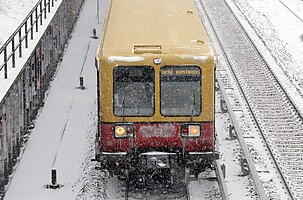
485 series
Winter 2020/2021: approaching Hermannstraße station
- ©
- S-Bahn Berlin/Jens Wiesner
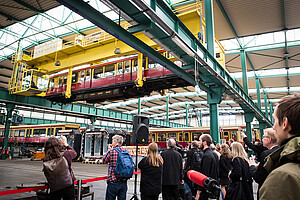
485 series
As part of the “50 measures scheme”, these 485 series trains were once again made fit for service.
- ©
- Deutsche Bahn AG/Lydia Hesse
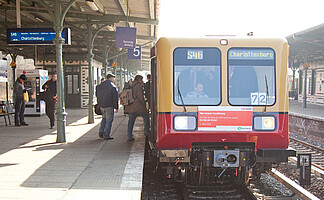
485 series re-design
Originally, the 485 series was scheduled for gradual phasing out from 2003. But in 2010, these trains received another update and refurbishing to boost the S-Bahn fleet.
- ©
- Phillip Goers
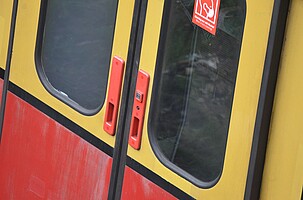
485 series
Door opening button
- ©
- S-Bahn Berlin/Jens Wiesner
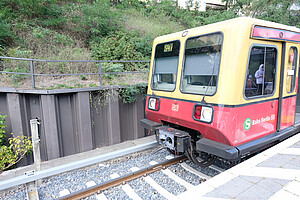
485 series
At Hermannstraße station
- ©
- S-Bahn Berlin/Jens Wiesner
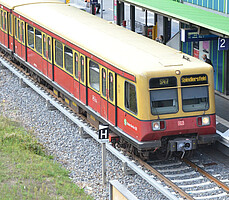
485 series
At the Hermannstraße station tracks
- ©
- S-Bahn Berlin
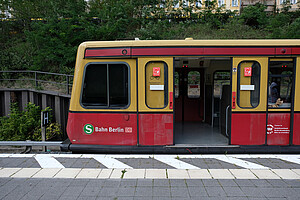
485 series
At Hermannstraße station
- ©
- S-Bahn Berlin/Jens Wiesner
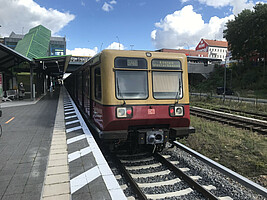
485 series
On Hermannstraße station platform
- ©
- S-Bahn Berlin/Jens Wiesner
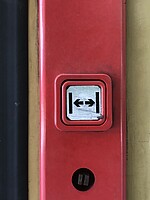
485 series
Door opening button
- ©
- S-Bahn Berlin/Jens Wiesner
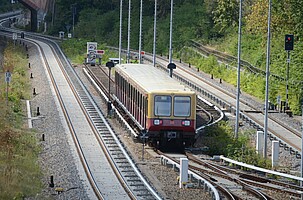
485 series
Awaiting service on the S47 line
- ©
- S-Bahn Berlin/Jens Wiesner
Why some trains are called 885
A closer look reveals that some carriages are labelled ‘885’. This is the production series designator for unpowered side carriages that, together with a powered railcar with operator cab, make up a whole quarter train.
Historical photos of the 485 series
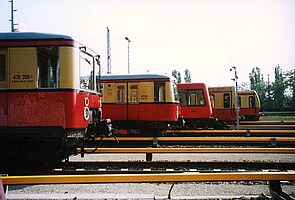
Historische Aufnahme
Diese Baureihen waren 2000 noch gemeinsam auf Berlins Schienen unterwegs: (v.l.n.r.) 476, 477, 485, 480, 481
- ©
- Hist. Sammlung/DB AG/Donath
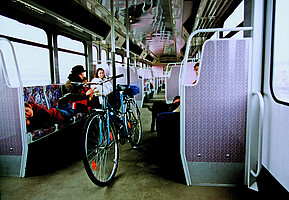
Archivnummer: DB25383
Innenraum der BR485 mit Berlin-Beklebung (1999)
- ©
- Deutsche Bahn AG
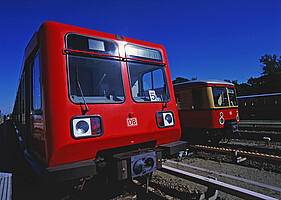
Archivnummer: DB25593
Frontansicht der BR485 - noch im Coladosen-Look (2001)
- ©
- Deutsche Bahn AG
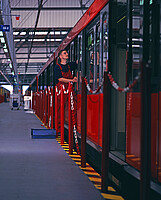
Archivnummer: DB25711
Reparaturarbeiten an der BR485 - noch im Coladosen-Look - in der Wagenhalle (2000)
- ©
- Deutsche Bahn AG
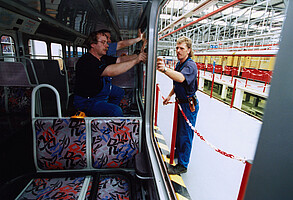
Historische Aufnahme
Auswechseln einer Scheibe bei der Baureihe 485; gut sichtbar noch das alte Sitzmuster (2000)
- ©
- Deutsche Bahn AG
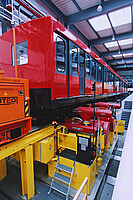
Archivnummer: DB25717
885er-Beiwagen - noch im Coladosen-Look - im Werk auf der Unterflurradsatz-Tandem-Drehmaschine (2000)
- ©
- Deutsche Bahn AG
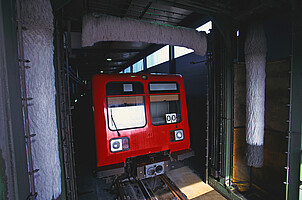
Archivnummer: DB25709
Zug der BR485 in der Waschanlage
- ©
- Deutsche Bahn AG
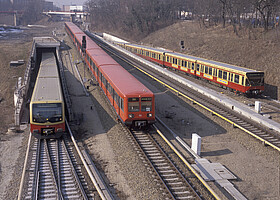
Historische Aufnahme
Drei Generationen an S-Bahnbaureihen gemeinsam auf der Strecke nahe S-Bahnhof Gesundbrunnen: (v.l.n.r.) 481, 485 und 480 (2003)
- ©
- Hist. Sammlung/DB AG/Jazbec
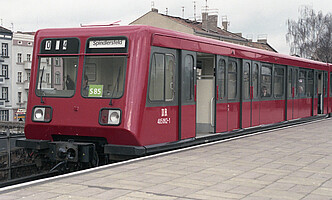
Historische Aufnahme
Baureihe 485 - noch im Coladosen-Look und mit D(eutsche)-R(eichsbahn)-Logo (vor 1994)
- ©
- Hist. Sammlung/DB AG
| Technical specifications | |
|---|---|
| Specification: | powered carriage/side carriage |
| Quantity: | 166 quarter-length trains (each consisting of a powered car and a side carriage) of the series have been produced since 1987. None of them are still in passenger service. |
| Coupling length: | 36.200 mm |
| Vehicle width: | 3.000mm |
| Floor height: | 1.120 mm |
| Seats (additional standing capacity): | 102 (202) |
| Maximum speed: | 90 km/h |
| Maximum acceleration: | 0,68 m/s² |
| Bogie axle base distance: | 2.200 mm |
| Performance: | 4 x120 kW = 480 kW |
| Supply voltage: | 750 V DC |
| Empty weight: | 60,0 t |
